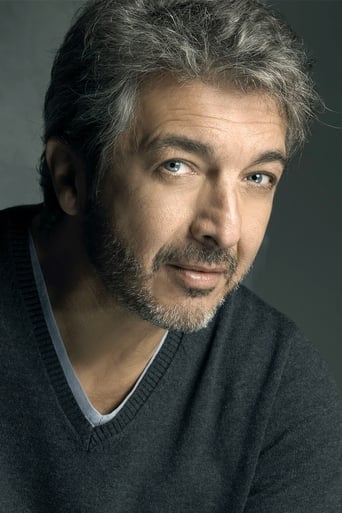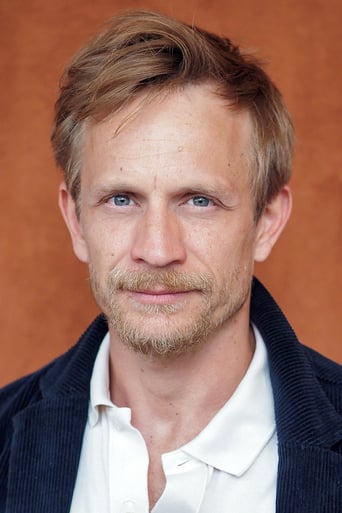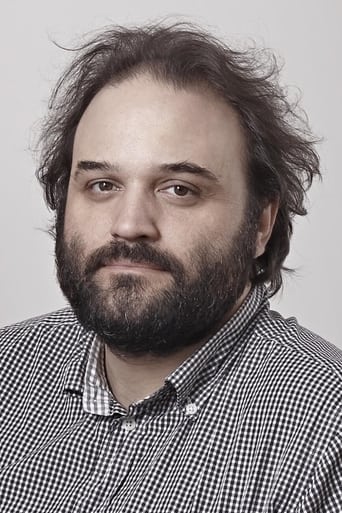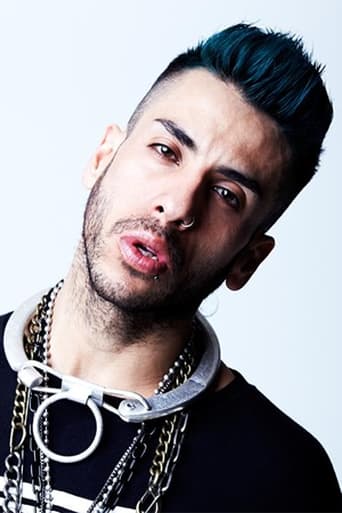Lovesusti
The Worst Film Ever
Unlimitedia
Sick Product of a Sick System
Kaelan Mccaffrey
Like the great film, it's made with a great deal of visible affection both in front of and behind the camera.
nqure
'White Elephant' begins with a prologue about how Julian brings a younger priest Nicolas back to Buenos Aires. It also begins with Julian undergoing a scan, reminiscent of Kurosawa's 'Ikiru', a film about one man trying to make a small difference in the face of death. Both priests begin the film suffering in different ways. One physically from a terminal illness, only known to us the viewer (dramatic irony), and perhaps brought on by overwork/stress; the other, spiritually, from a guilt-ridden conscience after surviving a massacre which left his congregation dead.Two priests with different approaches: Julian is a latter-day St Francis of Assisi, a man who has given up his wealthy background to work in the slums and who tries to make a difference by battling political bureaucracy (inefficiency & indifference) & the hierarchy of his own church authorities, who appear more interested in 'talk' than action. Nicolas works on the front line, mediating between warring gangsters & working alongside his secular counterpart, a social worker, Luciana, with a mutual attraction developing between them.The 'White Elephant' of the film's title is a huge unfinished hospital, now occupied by drug addicts, and which acts as a metaphor for the stunted development of the slum as a whole- and the failure of a new smaller development (the workers go on strike after not being paid) emphasises the continued failure by the next generation of politicians to address these issues. As one reviewer put it well, it is as if the slum has also been 'forgotten' by God, too. And the people of the slum finally reach breaking point after yet more bureaucratic inefficiency leads them to taking matters into their own hands (to finish the development for themselves) and a confrontation with the authorities.The film adopts a visceral approach, more an edgy, fast-paced social drama than an examination of faith in, say, the poetic manner of Bresson. It contains a number of plots, such as the relationship between the two priests fighting crime, poverty and despair (including their own), a love story, the attempt to help a young delinquent as well as a social critique. Perhaps this is one of the flaws of the film. It contains too many plots and tries to cover so many issues, making it feel disjointed.For a film about priests, it didn't have many moments of 'transcendence', but it seemed, to me, to be more about what a priest/church should be in the 21st century & a damaged world.Instead, the film-maker, Trapero, imaginatively uses imagery to make biblical allusions. Candles/lights shining in darkness/at night, recall John 1:5 (The light shines in the darkness and the darkness has not overcome it); Nicolas' journey into a gangster's compound is literally 'a walk into the valley of the shadow of death'; and the young addict/delinquent, Monito, is 'a prodigal son'/lost sheep, sent to the church's 'farm' in an effort to lure him away from bad influences. The figure of Mary, Mother of Grace, to whom the priests pray for succour, has a dark counterpoint in a woman who is in charge of a rival neighbourhood gang.I actually think the film shows what the Catholic Church must do if it is remain relevant in the 21st century. That it must socially engage with those most in need & reminded me of a recent BBC4 programme on 'The Salvation Army', where pastoral work was described as 'the church outside four walls'. The Church cannot survive in seclusion (Nicolas is banished to a monastery at the end of the film), but must take sides (of the poor) and be socially engaged if it is to remain relevant. And, after all, did Christ not consort with the poor & the marginalised?Regarding the background to the film, it's interesting that the Catholic Church has since elected its first Latin American, and specifically Argentine, Pope who has a reputation for supporting the poor.The emphasis is less on 'sin', but on 'faith', as Nicolas utters during a service in the church, a faith based less on judging people and more on maintaining one's faith & hope in the darkness. This contrasts with the more cynical, bitter Cruz, a support worker who despairs at the pointlessness of it all (a plot twist reveals the truth about his 'exit').This is encapsulated in the behaviour of Nicolas himself. Who/what is a good man in a flawed world? Is a priest who swears, drinks, smokes & has sexual desires, a good man? Then, the answer is an overwhelming 'Yes'. The film does not judge its protagonist but rather shows Nicolas as a man who tries to do good, presenting a modern take on Christian (Catholic) values such as the issue of celibate priests. His relationship with Luciana is not purely sexual, but about a mutually supportive relationship based on love (a marriage in all but name).Gradually, Nicolas realises why Julian brought him to Buenos Aires. He experiences faith & doubt. Can he live up to the faith shown in him and live up to his responsibilities? As Luciana says: 'Leave? It's easier.'The ending was perhaps melodramatic as Julian tries to help Monito escape from the police, though Julian becomes a very modern martyr, reminiscent of the real-life figure of Fr Carlos Mugica, who worked in the slum and whose murder has never been solved.The film featured strong performances from all of the lead characters, Ricardo Darin as Julian, Martina Gusman as Luciana and it was interesting to see Jeremie Renier (The Child/Dardenne brothers), mature as an actor. I didn't recognise him from that earlier film.
ma-cortes
Very good movie excellently performed by Argentina big star , Ricardo Darin . This Cannes selected film contains a fascinating , brooding story , perfectly acted and concerning the narration about the construction a hospital of riveting manner . The "Villa Virgin", a shantytown in the barrios of Buenos Aires. Julian (Ricardo Darin) and Nicolas (the French Jeremie Renier) , two priests and long-standing friends, work tirelessly to help the local people. Julian uses his political connections to oversee the building of a hospital. Nicolas unites him following the flop of a mission he was leading in the jungle , after paramilitary forces assassinated members of the community. Deeply troubled, he finds a little comfort in Luciana (Martina Gusman), an enticing social worker . As Nicolas' faith weakens, tension and violence between the barrio drug dealing cartels grow. And when work on the hospital is halted by ministerial decree , the fuse is lit...This is a co-production Argentina/Spain/France , being well paced , skillfully edited and very interesting . The picture is plenty of thrills , intense drama , a love story , violence and thought-provoking issues . After splendid collaboration between Pablo Trapero and Ricardo Darin in a thriller titled ¨Carancho¨ , this relationship worked out so well that they're doing it again . Trapero's Elefante Blanco seems like a very likely candidate to turn up in becoming quite simply one of the best films of its year . The insightful storyline relies heavily on the continued relationship among three protagonists but it isn't tiring ; being entertained and with numerous diverting moments and agreeable feeling . Darin and Jeremie Renier star as priests coping in very different ways with the violence and corruption in the Buenos Aires slum of Villa Virgen where they work , both of them carry out excellent performances along with Martina Gusman playing as an atheist social worker . However , Ricardo Darin steals the show as the obstinate priest , Darin is a magnificent leading figure of the most important Argentinian movies such as ¨El Aura¨, "El Faro" (1998), "El Mismo Amor La Misma Lluvia" (1999), "Nueve Reinas" (2000), "La Fuga" (2001) and especially ¨El Hijo de la Novia¨ . Evocative production design filmed on location in barrios and slums from Buenos Aires , Capital Federal and Plaza Guemes . Emotive as well as sensitive musical score by the British Michael Nyman . Colorful and adequate cinematography by cameraman Guillermo Nieto . The motion picture well produced by Alejandro Cacetta and Juan Vera , was compellingly directed by Pablo Trapero . Trapero is a good filmmaker , his best film was ¨Carancho¨, dealing with a slow burning exercise in moral decay and his usual actress results to be Martina Gosman who has worked in various film with him , such as : ¨Lion's den¨ , ¨Nacido y Criado¨ , ¨Carancho¨ and of course this ¨Elefante Blanco¨ . This dramatic flick is an above average film and Argentina's official submission to the Cannes Film Festival and achieved several Awards of the Argentinean Academy. Indispensable and essential seeing for Ricardo Darin fans .
jotix100
The evils of society at large, are examined by Argentine director Pablo Trapero. He sets his story in the "favela" like shantytown that sprouted near an abandoned huge project for a hospital that was started decades ago in Buenos Aires, seen today as a typical "white elephant", an useless structure that houses today the marginalized inhabitants to the nearby slum. Drugs are a lucrative business within this ghetto. Assault weapons and fire arms can be found almost everywhere. Add all that to the precarious living conditions and this sort of hell on earth is not even fit for anyone to live.There is a prologue to the story. Father Julian, who has met Nicolas as they were studying for the priesthood, goes into the Peruvian jungle to rescue his friend from the massacre which he miraculously survived, carrying the guilt for not having died himself. Julian brings Nicolas to Buenos Aires to the church where he is tending to the poor inhabitants of the shantytown. Unknown to Nicolas, Julian has been diagnosed with a strange neurological disease, which is never mentioned. In a way, Julian has reached to Nicolas to be his successor, once he is not around.Nicolas encounters all kinds of human tragedy in the area. A young social worker, Luciana, is another source for bringing hope to the desperation of the people in the shantytown. It does not take long before Nicolas realizes the attraction he feels for the young woman, who also has fallen passionately in love with the young priest. As was rages within the confines of the slum town, bringing tragedy into the area. Julian has to do wonders in order to feed the needy while silently suffering the disease that is robbing his life.The screenplay was a collaboration by the director, Martin Mauregui, Alejandro Fadel and Santiago Mitre. The idea is not exactly new, as this has been the subject of movies of such impact as Fernando Meirelles' "City of God" as well as others that have examined the misery, despair and cruelty found in places such as the one depicted in this film. Where Mr. Trapero succeeds is in the handling of the cast. Ricardo Darin is a natural whose work gets better all the time. Jeremie Renier has some good moments, although he seems a bit out of place. Martina Gusma, who is Mrs. Trapero in real life, makes the most of her Luciana. Guillermo Nieto's cinematography is crude, something that was required to make the movie work. Michael Nyman's film score does not go well with the images on the screen.
Kevin Koshka
The perfect portray of human hypocrisy. I guess the actual message in this movie is that nothing really ends, nor the struggle for a better life or the evil that keeps people from getting a better life.Some other reviewer stated this kind of story had already been told... Well has it?. Not this one in particular, I think the characters are quite real. Both main characters and extras have done a wonderful job keeping it real, nothing i have seen in Argentinian films for a while.The shots are beautiful and seem to capture very well the actual landscape of the "villas". Music on the other hand doesn't live up to the most dramatic moments in the film, and personally I think it could have been improved.To sum up "Elefante blanco" is definitely a movie to be watched, and mostly a message to be heard.





